

Discover more from Fast Women
Issue 320, sponsored by Topo Athletic
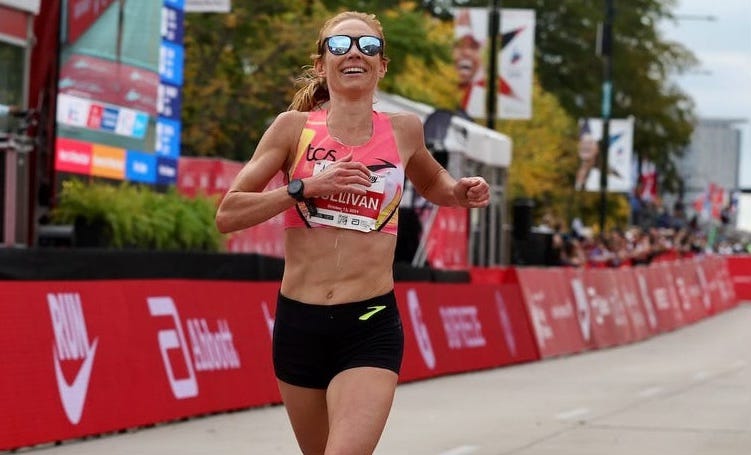
After a trying year, Susanna Sullivan’s Chicago Marathon success is all the sweeter
Susanna Sullivan, a sixth-grade math teacher in McLean, Virginia, began working at a new school over the summer, so it took a little time for word to spread about her other job. She didn’t tell the students she teaches that she would be racing in the Chicago Marathon’s elite field on October 13.
“Sixth grade is such an interesting age,” she said in a phone call with Fast Women. “Some of them would think it’s the coolest thing in the world if you mentioned it, and then some are definitely like real tweens and would find it—to borrow a word from the kids—cringe for me to say anything.”
But after she finished seventh in Chicago and ran 2:21:56, word began to spread. When she returned to school last week, she didn’t say anything to her first-period class. But she found out during her second-period class that the social studies teacher had shown her students the Runner’s World article about her Chicago run, so they now know they’re learning from America’s fastest teacher. They were excited to discover that she has a Wikipedia page.
Sullivan, 34, led the American women in Chicago and took 2 minutes, 31 seconds off of her personal best. It was a gratifying performance after her last two marathon builds did not go to plan.
Trusting her instincts
When Sullivan heard that some of the other top American women running Chicago were considering going after Emily Sisson’s American record of 2:18:29, she knew she wouldn’t be going with them. But in the end, it was Sullivan who set out at the most ambitious pace, while Betsy Saina, Keira D’Amato, Emma Bates, and Sara Hall hung back.
Sullivan’s coach, Andrew Gerard, who is the head cross country and track & field coach at George Mason University, had told her to trust herself and that if the pace felt right, she should go with it. Getting a GPS signal during the race’s early miles is tough, so Sullivan didn’t know if she could trust the 5:12 and 5:17 she saw on her watch early on. But the pace didn’t feel that quick, so she kept going.
Sullivan hit 5K in 16:27, with a projected finish time of 2:18:48, but soon after, she tucked in behind Reid Buchanan, who was pacing the 2:20 group, and backed off the pace ever so slightly. She went through halfway in 1:10:09, and though she slowed a bit in the latter stages of the race, she hung on well and was delighted to dip under 2:22. She didn’t know for sure that she was the top American until the last two or three miles of the race. That distinction earned her $15,000.
Coming back after an unusual injury
In the summer of 2023, things seemed to be going Sullivan’s way. She signed a sponsorship deal with Brooks, and she was preparing to represent Team USA for the first time, in the world championships marathon. But about 10 days before the race, her knee started to ache. She consulted several doctors and they all thought it couldn’t be anything worse than bursitis. And they thought that once the race-day adrenaline kicked in, she would be okay.
In the final days before the race, she did all of her training in the pool, while trying to convince herself her doctors were right. But it was difficult to fuel properly leading up to the race because the pain left her feeling constantly nauseous.
Coming out of a water stop 5K into the race, Sullivan’s legs got tangled with a competitor’s, which forced her into an unnatural motion. She felt an excruciating jolt of pain, and her doctors now think that might have been the moment a stress fracture in her patella became a full fracture. Instead of dropping out of the race, Sullivan surged to the front. She wasn’t trying to run away with the race; she just didn’t want to risk any more jostling. “I was like if anybody else touches me, I might not finish this marathon,” she said. “I didn’t come this far and train this hard to DNF.”
She made it to the finish line, taking 58th in 2:44:24, but that was just the beginning of many months of struggle. Because Sullivan’s injury was such an unusual one, no one had a good sense of how long it would take for it to heal. After six weeks, she convinced her doctor to order another MRI, and the injury looked even worse. “Then I got into a very deep, dark place emotionally,” she said. “I feel like my husband and coach were kind of tag teaming, keeping my spirits up as much as possible.”
Sullivan vigorously cross trained in the pool throughout her injury, and eventually she was able to add some running on an anti-gravity treadmill as well. By the first week of December, she was back running on land. And on January 14, she ran a 1:10:53 at the Houston Half Marathon, which was only three seconds off of her personal best at the time. Though she considered her half marathon PR to be her weakest, with the Olympic Marathon Trials fast approaching on February 3, it was an encouraging result in the moment. But it caused her knee pain to return.
In the weeks leading up to the Trials, Sullivan mostly trained in the pool and ran on an anti-gravity treadmill. And then she got Covid, which was the death blow to her Trials hopes. “It was like, read the signs, this is not going to happen,” she said. After putting out a post explaining why she wouldn’t be running, Sullivan did her best to avoid looking at anything Trials-related for a while. She was devastated to miss the race.
When she finally watched the race several weeks later, she was interested to see how it played out. “My coach was like, ‘You get to be sad about it and then you’re done and we’re looking forward,’” she said. “I think that that was really helpful, because we just kind of stopped talking about it and he wasn’t willing to brood on it, which helped me refocus.”
By April, Sullivan was starting to feel like herself again. In her second race back post-injury, she finished 12th at the New York Mini 10K in June, running a personal best on the roads. “I had cross trained so much, I was hopeful that was worth something and then I wouldn’t have to wait months and months before seeing a PR,” she said. “But to get a PR at the Mini made all that pool time worth it.”
She raced the 10,000m at the U.S. Olympic Track & Field Trials knowing that her world ranking was too low for her to make the team. Still, Sullivan led for the majority of the race to keep the pace honest. Her school year had just ended, and she had flown across the country, to Eugene, Oregon. She wanted to run the best race possible, and she knew that jogging most of the race and then kicking would not benefit her.
Sullivan was thinking about what Gerard often says to the college athletes he coaches. If they tell him their races didn’t play out a specific way, he’ll say, “Were you not in the race? If you wanted it to go a certain way, you had some responsibility in that.” That resonated with her. She finished 14th in 32:42.12.
Throughout the summer, Sullivan built momentum with each race. And between the Peachtree Road Race and the Beach to Beacon 10K, on July 20, she got married in Bar Harbor, Maine. She has known her husband, Edward Hickey, who is a major in the Marine Corps, since high school.
Sullivan was in the midst of marathon training, so the honeymoon will have to wait. The morning of the wedding, she ran 18 miles with her longtime weekend training partner, Marty McCormick. Sullivan fittingly wore a pair of white Brooks Ghost Maxes with her wedding dress. She and Hickey will be keeping their own names. “I can’t teach middle school and have Hickey as a last name,” she said.
A coaching change leads to a breakthrough
Sullivan made her marathon debut at age 25, finishing seventh at the 2015 Grandma’s Marathon in 2:35:39 in the pre-super-shoe era. She ran the race conservatively, and came out of it thinking she could probably could have run a few minutes faster. But it would take more than five years before she would run another marathon PR.
By 2020, Sullivan knew she needed a coaching change. She wanted something more individualized and collaborative. From their first meeting, Sullivan was blown away by Gerard. “I felt like he was very thorough, very thoughtful, and very aware of women’s running issues,” she said. When he asked what she was looking for in a coach, she told him she needed someone to save her from herself. Based on past feedback, she thought she wasn’t running well because she was overtraining.
“He looked at my [training] and was basically like, ‘Yeah, that’s not our problem. You’re not overtraining. You need to do the strength work and you need to sleep and eat in a way that supports a higher workload, but you also need a higher workload,’” she said. “That was a perspective shift that I hadn’t anticipated, but it has clearly proven to be the right answer for me.”
Since then, Sullivan has jumped to a new level in the marathon. She PRed at the Marathon Project in 2020, running 2:33:27. And she has now PRed in the marathon five more times since she began working with Gerard, including a breakthrough third-place finish at Grandma’s Marathon in 2022, where she ran 2:26:56.
Under Gerard’s tutelage, Sullivan began doing higher volume workouts. Her harder days became harder, which forced her easy days to be easier. She trusted him fully from the beginning, and by following his advice, she was able to put in much more consistent training.
Sullivan says it was clear when she started working with Gerard that he didn’t really have the time to take anything else on, but he was making it work. His commitment to her running made her all the more determined to be smart about her training. “If he’s going to stand out in the cold in a hat and gloves and watch me run kilometer repeats through the dark in December, if he says to take it easy because tomorrow’s going to be hard, I listen,” she said. “He could be at home having dinner, but instead he’s out on the track with me.”
He also made sure she understood that he wouldn’t be able to attend her races, because college coaching is such a demanding job. Chicago was the first marathon he saw Sullivan run, and having him there meant a lot to her.
“We had both been through a lot of frustration and I was hoping that it would all be worth it and that I could thank him for sticking by me and being patient,” Sullivan said. “It was not easy to get me back from a fractured kneecap and being totally down in the dumps, but he managed to.”
Making it all fit
Sullivan’s new school starts earlier than her previous one did, which has made it tougher to squeeze in her morning workouts. Recently she has been doing pool workouts in the mornings, because she prefers not to run in the dark. But her school day also ends earlier, which makes it easier for her to attend practice at George Mason, where she’s a volunteer assistant coach. She helps out the team where she can, and she also gets in her own workout. She loves it when her training lines up with what the men’s team is doing.
Fitting everything into Sullivan’s packed schedule is a constant challenge. Until the summer of 2023, she and Hickey were in a long-distance relationship. He was always committed to helping her, but things are easier now that they live together and he can handle chores like laundry and grocery shopping. In the weeks leading up to Chicago, Sullivan let less essential tasks slide. Her wedding photos arrived in mid-September. She started to look through them, but then chose sleep instead.
The week after Chicago wasn’t particularly quiet, either. Sullivan fielded media requests and then flew to Toronto on Thursday night for Sunday’s Toronto Waterfront Marathon. She serves as an ambassador for the Team TCS Teachers program. She’ll be at the New York City Marathon as well, in the same role. After that, perhaps things will quiet down a bit, but it seems unlikely.
Looking forward, Sullivan would love to have another shot at running the marathon at the World Athletics Championships. Three U.S. athletes will be selected, and she’s currently sitting second on the descending order list, but the qualifying window doesn’t close until May. The race will take place September 14, which would interfere with her school schedule, but she’d have to make the team first. And she’s also thinking about new time goals.
“I feel like everybody is trying to recalibrate what they think is normal in the sport,” she said. “With super shoes, things are just different. I would have never fathomed breaking 2:20, but now that I’ve run 2:21-high, it doesn’t seem completely crazy.”
Thanks to Topo for supporting Fast Women this month
The Topo Atmos offers game-changing comfort, combining max cushion with the signature Topo fit, featuring a roomy toe box, a low heel-to-toe drop, and a secure midfoot.
When the Atmos launched, Ultrarunning Magazine wrote, “You might say the Atmos is a shoe designed to out-Hoka Hoka, and in many ways, it does just that.”
As someone who has been trying out the Atmos, I can vouch for the fact that it’s an incredibly comfortable shoe. I love its spacious toe box, secure midfoot, and the cushion of the shoe.
Experience game-changing comfort yourself, by using the code FASTWTOPO for 15% off full-price items at topoathletic.com. Offer valid until 1/31/25.
Other News and Links
Emma Coburn announced that her daughter, Betty Ann Bosshard, was born on Friday via a surrogate.
Parker Valby has signed with New Balance. She will be based in Boston, train with New Balance Boston, and be coached by Mark Coogan. A lot of people expressed their surprise last week that Valby didn’t sign with Nike, the company with whom she had an NIL deal. But anyone who followed Sarah Lorge Butler’s previous reporting on the topic knew that there was a six-month right-of-first-refusal clause written into Valby’s contract. So the longer she went without signing, the more likely it seemed that she wouldn’t be going with Nike. Valby’s contract is believed to be worth more than $800,000 per year. I highly recommend reading the linked article, because it includes many interesting details about Valby and the business side of the sport. (Runner’s World)
Speculation about Ruth Chepngetich doping became bad enough that this past week, Athletics Kenya felt the need to put out a statement in her defense. I can’t recall anything like that ever happening before. But the bottom line is that there is a lot of talk but no new information. I’m kind of surprised people have had such a strong negative reaction to Chepngetich running 2:09:56, because thanks to super shoes (and, yes, probably doping, too) being a women’s distance running fan in recent years has been all about suspending disbelief about what’s possible for women. To me, practically every record-breaking performance these days sounds like something that should be impossible. That’s the new normal. I appreciated what Des Linden and Kara Goucher had to say about it on Nobody Asked Us last week. Of all of the hot takes out there, I thought theirs was the best.
Keira D’Amato said that it looks like the injury that forced her to drop out of the Chicago Marathon is some sort of stress reaction or fracture in her calcaneus. But as is her way, she’s approaching it with the most positive attitude possible. D’Amato turns 40 today.
Nikki Hiltz will be a Grand Slam Track racer during the 2025 season, and according to this article, we’ll next see them racing at Hawaii’s Merrie Mile in December. (Runner’s World)
“Thankfully recovered well enough from Chicago to sprint faster than I ever have before when we ran into a grizzly bear, right after Ryan took this video,” Sara Hall wrote in an Instagram story last week. “Scariest moment of my life.” Thank goodness she’s okay.
Sara Vaughn went into the Chicago Marathon sick and dropped out after 15K. Not everyone who has a rough day gets a marathon do-over, but circumstances have aligned for Vaughn, and she announced last week that she has been added to the New York City Marathon field.
Wildwood Running, an organization that has done a fantastic job of educating high school girls who run, has launched Wildwood EDU, free online monthly educational sessions for athletes, coaches, and parents. To take part, you can sign up here.
Taylor Dutch wrote about the ways in which professional distance runners in Western North Carolina have been affected by Hurricane Helene. (Runner’s World)
Former Huntington University cross country and track & field coach Nick Johnson was sentenced to one year in prison/jail plus one year of probation last week, after being found guilty of sexual battery. This is his second felony conviction. This article notes that he’s a new dad and that many people wrote letters of support on his behalf.
The parents of former college runner Julia Pernsteiner, who died by suicide in 2021, have settled their lawsuit that alleged that Ron Grigg, Pernsteiner’s coach at Jacksonville University, tormented her about her weight and learning challenges. The terms of the settlement were not disclosed. Pernsteiner was vocal about her experience and tried to hold Grigg accountable prior to her death.
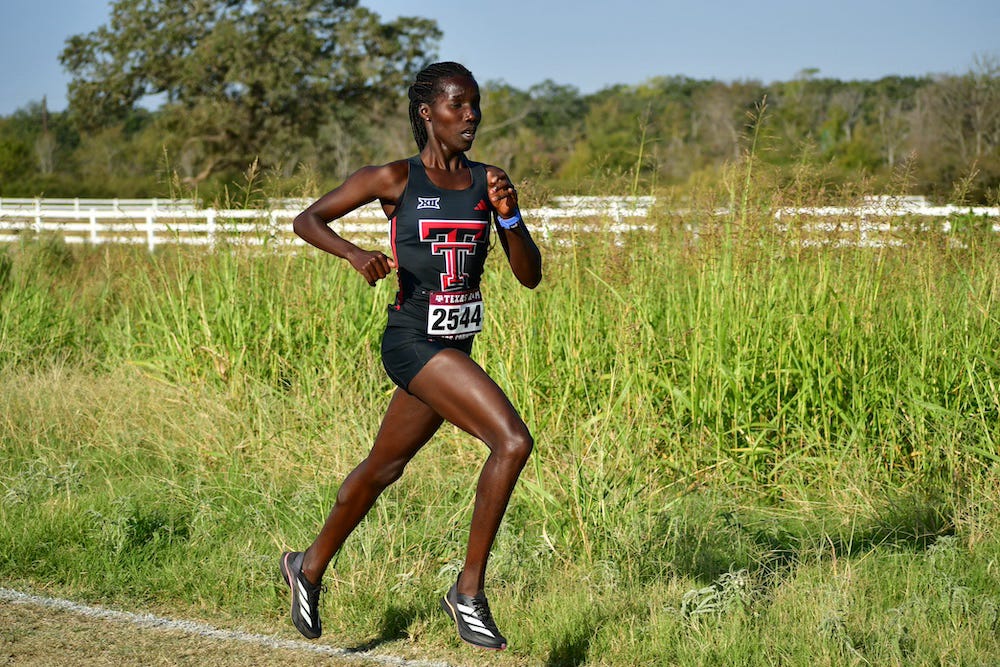
Pamela Kosgei establishes herself as an early NCAA favorite
There’s still a lot of racing to come, but early on, it sure seems like this is shaping up to be the deepest year NCAA distance running has ever seen. Pamela Kosgei’s second race in the NCAA was a big one, as she topped a strong field at Pre-Nationals in Wisconsin. The race came down to an exciting sprint finish between New Mexico’s Kosgei and Florida’s Hilda Olemomoi, with Kosgei winning, 18:59.1 to 19:02.9. The top six runners all broke the Thomas Zimmer Championship XC course record Parker Valby set at last year’s Nuttycombe Invitational. To be fair, Valby raced in rain, wind, and mud, while Saturday’s conditions were nice and dry.
Kosgei’s quick start in the NCAA is no surprise. She finished third in the U20 race at the 2023 World Cross Country Championships while representing Kenya, and her older sister, Brigid Kosgei, once held the marathon world record. But it’s exciting to see Kosgei have plenty of competition up front. Olemomoi is a familiar face at the top of the NCAA standings, but she’s wearing a new uniform this season. She transferred from Alabama to Florida, following Will and Samantha Palmer, who previously coached her at Alabama.
BYU, ranked No. 2, pulled off a minor upset in the team race, winning with 105 points over No. 3 Washington (157) and No. 1 NAU (165). West Virginia, who had only five finishers, produced the biggest surprise of the day, as they went in ranked 28th and finished fourth (204). (Results)
There are also some excellent collegiate runners who weren’t in Wisconsin over the weekend. Texas Tech’s Juliet Cherubet, who was 18th at NCAAs last year, also broke a course record previously held by Valby, winning the Arturo Barrios Invitational in 18:37.0. She improved the record by 21.2 seconds. (Results)
Running at home, Doris Lemngole and Brenda Tuwei finished together in the Alabama Crimson Classic, running 19:04.8 and 19:04.9, respectively. (Results) And Providence’s Kimberley May won the Princeton Fall Classic in 19:16.1, with Georgetown’s Chloe Scrimgeour taking second in 19:23.3 and leading her team to a 59–65 win over Providence. (Results)
Additional Results
Kenya’s Joyline Chepngeno dominated the Golden Trail World Series Final, covering the challenging 23.5K course in 2:08:39. Lauren Gregory had a fantastic race, making a late pass to take second in 2:13:00. And despite appearing to injure herself mid-race with a bad ankle roll, Kenya’s Joyce Njeru held on to take third in 2:13:30, which was enough to secure the overall series title. Given how challenging it is to cover a race on such tough terrain, I was really impressed by the coverage. You can see some highlights here. (Recap | Results)
The weekend was a very busy one for marathoning. Ethiopia’s Yalemzerf Yehualaw won the Amsterdam Marathon in a personal best and course record of 2:16:50. (Results)
Ethiopians took the top four spots at the Toronto Waterfront Marathon, led by Waganesh Mekasha, who won in a course record of 2:20:44. Roza Dereje, who was returning to the marathon after three years off to start a family, finished second in 2:21:26. The race doubled as the Canadian championship, which Natasha Wodak won in 2:27:54. She finished fifth overall. (Results)
In her debut at the distance, Glenrose Xaba won the Cape Town Marathon in 2:22:22 and took 1:41 off of Gerda Steyn’s South African record, set last year. (Results)
Angie Rafter topped a deep field at the Hartford Marathon, running 2:38:09 in her debut, and her fiancé, Alex Norstrom, won the men’s race. Annmarie Tuxbury won the half marathon in 1:13:22. (Results)
Caitlin McGinley won the Baystate Marathon in 2:41:26, and Orla Rocha won the half marathon in 1:13:40. (Results)
Christina Murphy won the Columbus Marathon in 2:41:29. (Results)
Another winning couple: Sydney Devore won the Detroit Free Press Marathon in 2:42:46 and her husband, Andy Bowman, won the men’s race. (Results)
Ethiopia’s Alemaddis Eyayu won the Delhi Half Marathon in 1:08:17. Eilish McColgan, who finished fourth in 1:09:55, said on Instagram that the humidity and pollution made breathing tough. Also, this video of her pre-race shakeout run was something else. (Results)
Australia’s Lauren Ryan, of UA Mission Run Baltimore Distance, won the Baltimore Running Festival 10K by more than five minutes, in 32:06. Her teammate Abbe Goldstein won the 5K in 16:37. (Results)
Podcast Highlights
Ali Feller’s live show with Emily Sisson from the Chicago Marathon was a fun listen. Sisson said she has mixed feelings about her race at the Paris Olympics. She said she had a rough buildup and that she didn’t feel like herself, but acknowledging her disappointment has helped her move on. Most of the episode covered lighter topics.
On the Running—State of the Sport podcast, Jess McClain mentioned that she has learned a lot from her struggles and it shows. She mentioned wishing she could put the brain she has now into her younger body, and I think a lot of young runners would be better off if they could approach the sport with the level of perspective McClain has now.
For Susanna Sullivan’s Chicago Marathon story in her own words, she was on I’ll Have Another and the FloTrack Podcast last week.
Lindsay Flanagan recapped her Chicago experience on Kofuzi Run Club.
On The Running Effect Podcast, Juliette Whittaker said that accomplishing big goals over the past year didn’t fulfill her as much as she was expecting it to. “One thing I was missing this year was, like, what about all the joy and all the happiness in the journey to get to this moment? This next year, instead of focusing so much on accomplishments and outcomes…I just want to focus more on the journey and the process and finding love and finding joy in the sport.” This seems to be a recurring theme throughout the sport and beyond, so listen up, kids.
Thanks again to Topo for supporting Fast Women and remember to use the code FASTWTOPO for 15 percent off full-price items at topoathletic.com. Thanks, also, to everyone who helps keep Fast Women going with your support via Venmo and Patreon. I hope you all have a great week.
Alison
Subscribe to Fast Women
The latest in women's competitive distance running.






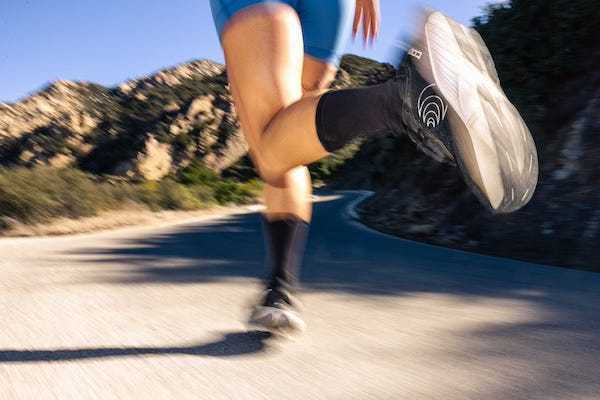
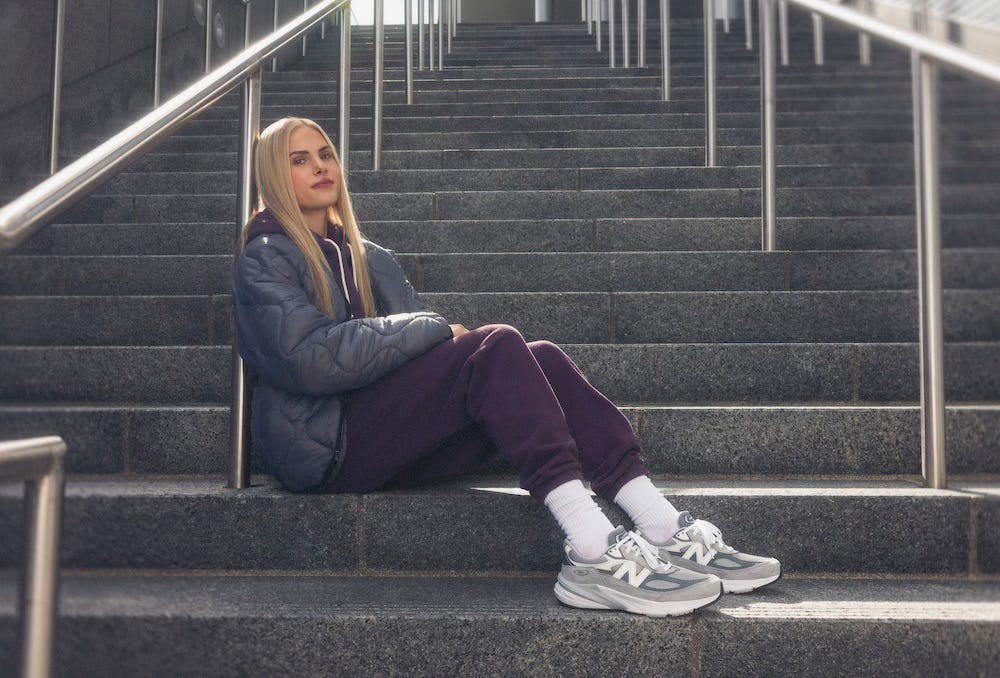





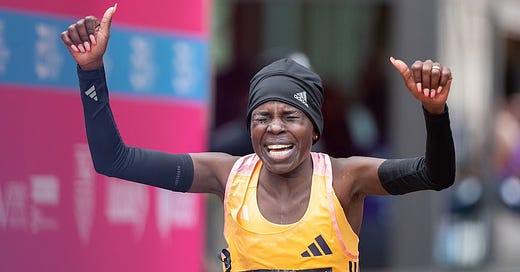

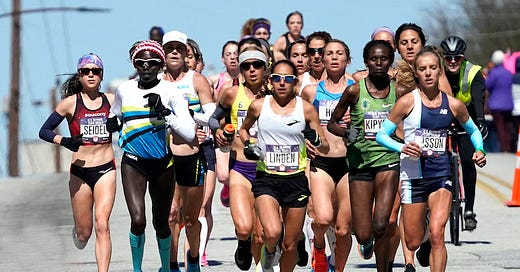

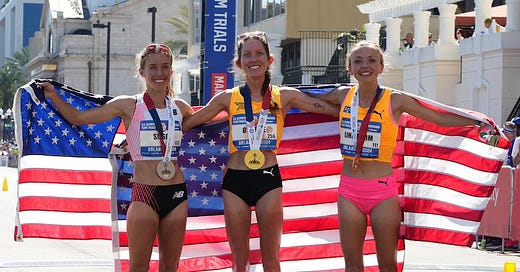

I really enjoyed your profile this week of Susanna Sullivan. I’ve been following her career since she won the Cherry Blossom 10 Miler several years ago. Thanks for all your great work!